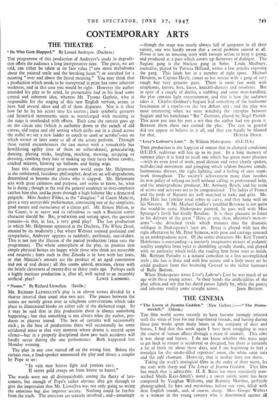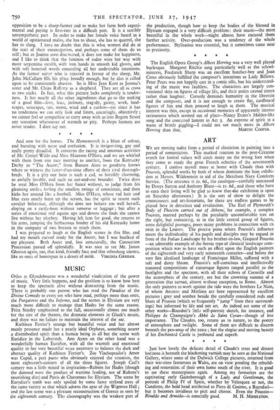THE CINEMA
"The Loves of Joanna Godden." (New Gallery.)—" The Home- stretch." (Odeon.)
THE film world seems recently to have become strongly infected with the virus of love for our four-footed friends, and having during these past weeks spent many hours in the company of deer and horses, I find that this week again I have been struggling to trace the course of human affairs through a maze of animals. This time it was sheep and horses. I do not know whether this mass urge to get back to nature is accidental or designed, but there is certainly a lot of fresh air about these days, and I am beginning to feel a nostalgia for the smoke-filled reporters' room, the white satin sofa and the café chantant. Howe/et, that is neither here nor there.
Taking the week's zoological films in the order of their merit, let me start with sheep and The Loves of Joanna Godderz. This film has much that is admirable. H. E. Bates has most sensitively tran- scribed Sheila Kaye-Smith's novel ; a sweet subtle score has been composed by Vaughan Williams, and Romney . Marshes, perfectly photographed, lie bare and mysterious before our eyes, filled with dear English sounds, and, of course, sheep. Miss Googie Withers as a woman in the young century who is determined against all
opposition to be a sheep-farmer and to make her farm both experi- mental and paying is first-rate in a difficult part. It is a terribly unsympathetic part. In order to make her female voice heard in a world of opinionated males, she has to shout, she has to quarrel, she has to slang. I have no doubt that this is what women did do at the start of their emancipation, and perhaps some of them do so still ; but as Joanna soon discovered, it does not make for happiness, and I like to think that the feminist of today wins her way with more serpentine stealth, with iron hands in smooth kid gloves, and with soft honeyed words concealing all her undesirable intentions. As the farmer suitor who is rejected in favour of the sheep, Mr. John McCallum fills his place broadly enough, but he also is called upon to be consistently abusive. So is Miss Jean Kent as Joanna's sister and Mr. Chips Rafferty as a shepherd. They are all as cross as two sticks. In fact, what this picture lacks completely is tender- ness. It has nearly all the other ingredients that go to the making of a good film—love, hat; jealousy, tragedy, gaiety, work, land- scapes, seascapes, sun, moon, wind and a cuckoo—yet since it has no tenderness we can only look and listen, uncaringly, objectively ; we cannot feel or sympathise or carry away with us into Regent Street any sensation whatsoever of warmth or pity. Perhaps farmers are never tender. I dare say not.
And now for the horses. The Homestretch is a blaze of colour, and bursting with noise and confusion. It is invigorating, gay and really pretty dreadful. It concerns the racing and amorous activities of Mr. Comel Wilde and Miss Maureen O'Hara, and we are whirled with them from one race meeting to another, &urn the Kentucky Derby to "The Ascott," from Buenos Aires to goodness knows where to witness the faster-than-time efforts of their rival thorough- breds. It is a pity our hero is such a cad, so horribly charming, so awfully lovable and such an out-and-out bounder. Twice does he steal Miss O'Hara from her fiancé without, to judge from his gleaming smiles, feeling the smallest twinge of conscience and then kicks her around like a football. Miss O'Hara, whose red hair and blue eyes nearly burn up the screen, has the spirit to resent such cavalier behaviour, although she does not behave too well herself, eloping on a cattle-boat without remorse or luggage ; but after a series of emotional and equine ups and downs she finds she cannot live without her playboy. Having left him for good, she returns to his arms, jumping the herbaceous border of his old Kentucky home in the company of two borzois to reach them.
I was prepared to laugh at the English scenes in this film, and had my mouth curved ready for the Ascott, but I was baulked of my pleasure. Both Ascot and, less unnaturally, the Coronation Procession passed off splendidly. It was nice to see Mr. James Gleason again, too, that kind, friendly face and that refreshing silence, like an oasis of homespun in a desert of mink. VIRGINIA GRAHAM.



































 Previous page
Previous page